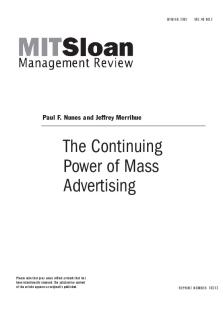PCN-100 Continuing education PDF

| Title | PCN-100 Continuing education |
|---|---|
| Author | Vanessa Dore |
| Course | English Composition II |
| Institution | Grand Canyon University |
| Pages | 1 |
| File Size | 43.3 KB |
| File Type | |
| Total Downloads | 11 |
| Total Views | 149 |
Summary
Download PCN-100 Continuing education PDF
Description
CONTINUING EDUCATION Addiction counseling is a rapidly changing and growing profession. It is estimated that there will be a 27–31% increase in the number of addiction counselors between 2010 and 2020 (Bureau of Labor Statistics, 2014; Counselor License Resources, 2014). Counselors need to keep abreast of new developments and research that impact their understanding, competency, and treatment provision. This represents a significant dilemma for counselors who, while ethically responsible for knowledge of the latest research, work in an agency that does not place the same value on current knowledge in the field. Reinforcing the necessity of continuing education, the NAADAC (2011a) indicates that due to the evolution of information, cultural impli-cations, changes, and demand of services, it is necessary for addiction counselors to keep apprised of current data in order to provide ethical and evidence-based treatments and interventions.Continuing education aligns counselors with professional and ethical standards, as it allows counselors to stay current with new trends and information and promotes competent practice (Daughhetee, Pueleo, & Thrower, 2010). Similarly, continuing education can provide a source of motivation for counselors seeking to continue their education beyond licensure and credentialing and who have a desire to continue to grow as professionals in their field as it provides a method for skill enhancement and development (Daughhetee et al., 2010), and it is necessary for keeping credentials and licensure current (NAADAC, 2013b).In terms of skill development, researchers have found that even a half day spent participat-ing in a continuing education program that incorporated active learning for practicing clinicians improved the use of brief intervention and screening for alcohol and other drugs. This change was found to last as long as 5 years after the class was taken (Saitz, Sullivan, & Samet, 2000).Continuing education or lifelong learning may take the form of coursework, workshops, mentoring, supervision, or other professional development methods. Another benefit of lifelong learning is that it may promote self-care, which then may minimize burnout (Daughhetee et al., 2010). Therefore, continuing education can be used to enhance treatment and assessment by addiction counselors and partially bridge the gap between research and practice, assuming, of course, that the continuing education program utilizes the current research....
Similar Free PDFs

PCN-100 Continuing education
- 1 Pages

Education Education
- 11 Pages

Continuing Power of Mass MIT Sloan
- 10 Pages

Science education
- 3 Pages

Interprofessional education
- 5 Pages

Indian Education
- 1 Pages

Civic Education
- 1 Pages

Inclusive Education
- 10 Pages

QUALITY EDUCATION
- 9 Pages
Popular Institutions
- Tinajero National High School - Annex
- Politeknik Caltex Riau
- Yokohama City University
- SGT University
- University of Al-Qadisiyah
- Divine Word College of Vigan
- Techniek College Rotterdam
- Universidade de Santiago
- Universiti Teknologi MARA Cawangan Johor Kampus Pasir Gudang
- Poltekkes Kemenkes Yogyakarta
- Baguio City National High School
- Colegio san marcos
- preparatoria uno
- Centro de Bachillerato Tecnológico Industrial y de Servicios No. 107
- Dalian Maritime University
- Quang Trung Secondary School
- Colegio Tecnológico en Informática
- Corporación Regional de Educación Superior
- Grupo CEDVA
- Dar Al Uloom University
- Centro de Estudios Preuniversitarios de la Universidad Nacional de Ingeniería
- 上智大学
- Aakash International School, Nuna Majara
- San Felipe Neri Catholic School
- Kang Chiao International School - New Taipei City
- Misamis Occidental National High School
- Institución Educativa Escuela Normal Juan Ladrilleros
- Kolehiyo ng Pantukan
- Batanes State College
- Instituto Continental
- Sekolah Menengah Kejuruan Kesehatan Kaltara (Tarakan)
- Colegio de La Inmaculada Concepcion - Cebu






